My first election in a long line of elections
I entered journalism during a turbulent time in American politics. But I learned several things from covering so many elections over the years, you can’t predict an election outcome, especially in Chicago.
By Ray Hanania
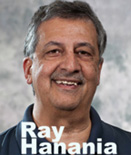 The very first election I remember as a child was the campaign of President Lyndon Baines Johnson and U.S. Senator Barry Goldwater in 1964. I was only 11 at the time.
The very first election I remember as a child was the campaign of President Lyndon Baines Johnson and U.S. Senator Barry Goldwater in 1964. I was only 11 at the time.
I was drawn to the election because of something Goldwater did. For many years during the 1950s and early 1960s, school children were taught to “duck and cover,” in response to what everyone believed would be a nuclear war with the Soviet Union. We hid under our desks.
Goldwater kept playing a commercial on TV that showed an atomic bomb exploding, only raising our fears of being incinerated by the explosion, or being eaten by giant Varanus komodoensis, or Komodo Dragons turned into even bigger monsters than they already were by the radiation. Those theories were fueling a hugely popular daytime science fiction genre of aliens and monsters created by nuclear weapons, like the giant ants in the scary movie, at the time, Them!
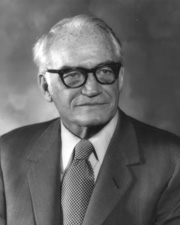
Senator Barry Goldwater (Photo credit: Wikipedia)
I think my dad supported Goldwater, who had a very cool campaign slogan. Au H2O, the periodic symbols for Gold and Water. But the nukes scared me and I rebelled against my Republican family and placed an “All the way with LBJ” poster on my bedroom window facing the front of the house.
LBJ had several advantages. He succeeded President John F. Kennedy who was murdered right before our eyes. The handsome president with the cute kids had died and the man who allegedly shot him was assassinated, right on live TV, too.
There were other reasons why Goldwater lost. JFK and LBJ had cool acronyms everyone knew well. Besides the Periodic Table element symbols, Goldwater only had BG which lacked the same powerful rhythm.
I actually cast my first unofficial vote a few years later in 8th Grade.
One of my teachers polled the classroom to see who we thought would win the U.S. Senate Race in 1966, Republican Charles Percy or Democrat U.S. Senator Paul Douglas.
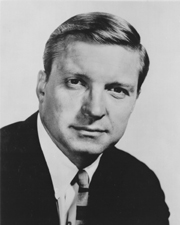
Illinois Senator Charles H. Percy. (Photo credit: Wikipedia)
It wasn’t that I was interested in politics at all. I was interested in girls, and going to the JCC with my friends every Thursday for the sock hops. It was at the start of 8th Grade, and a tough year with an English teacher who was insufferable towards me. Being the only Arab in a largely Jewish school system, it only got worse in the coming year.
I didn’t know what a senator did. In fact, I really didn’t understand the concept of “politics” that wound up defining my life in journalism and writing. Politics seemed to involve violence.
I only became interested because one day in school, one of my teachers polled the classroom to see who we thought would win. The teacher showed portraits of Percy and Douglas and asked, “Who would you vote for?”
Douglas looked like a grumpy old man, like one of the neighbors who was always accusing the kids on the block of breaking into his strawberry patch and eating all his strawberries. Percy looked like a happy person. He was smiling and had a bright face, light brown hair, and kind of reminded everyone of Kennedy.
Percy won that classroom poll hands down. And he went on to win the election, and took the office in January 1967.
The ugly side of politics came out in a big way, too. Percy’s daughter, Valerie, had been murdered during the election campaign, so it built up a lot of sympathy for Percy, the father. That year, too, a drifter murdered eight student nurses a few blocks south of where we lived on Chicago’s Southeast Side. And the following year, Israel attacked the neighboring Arab countries after years of mounting tensions and occupied all of the remaining land that belonged to my family.

English: John F. Kennedy, photograph in the Oval Office. (Photo credit: Wikipedia)
And two years later, the neighborhood collapsed under the weight of racial tensions and White Flight. Our family moved west to the Bogan High school, where we attended for a few months before being expelled. I was the darkest kid in the school at the time when Bogan became the command center of anti-integration protests and rallies.
So, we entered nearby Little Flower Catholic High School, and then we moved again to Burbank where I attended Reavis High school.
I’m not really sure why, but at Reavis, my ethnicity was unusual but the tensions were not there like they were at Warren Elementary school or at Bowen High school. A neighbor came up to us when we moved into our home on west 84th Street in Burbank and yelled “Punjab” at myself and my mom. I didn’t know what “Punjab” meant.
So, I had a chance to do better in high school without the pressures of anti-Arab racism that permeated Warren Elementary school. Back in the 1970s, Christians were excited to learn that one of their neighbors came from Bethlehem and attended the Church of the Nativity where Jesus was born. Of course today, because of polarized politics, most American Christians have forgotten about Bethlehem and are redefining Jesus as a Navy Seal armed to the teeth with enough weapons to take out the entire Islamic religion. Well, at least that’s what it sounds like on FOX & Friends.
Still, I was flunking English composition. But a nice English teacher, Mrs. Harris, recognized I had a talent and convinced me to start writing a column about my favorite topic, rock and roll music, for the high school newspaper, The Blueprint. It helped. The next year, as a senior, I was named the newspaper’s editor.

Richard Milhous Nixon, 37th President of the United States (Photo credit: Wikipedia)
And that got me some cool assignments, including reviewing an interview one of my reporters did with Eugene McCarthy who was battling it out with Hubert H. Humphrey to get at President Richard M. Nixon. That election, and girl friends and a cool blown 409 engine Chevy SuperSport converted to a 327 engine opened the door to rock and roll music and the protests at the Democratic National Convention at downtown Chicago that summer. I was there when Chicago police attacked music goers at Grant Park while waiting for Sly and the Family Stone to land in their helicopter and perform.
When I went to college at Northern Illinois University in 1971, my conservative tendencies came out, though, back then I was both for and then against the Vietnam War. I had friends on both sides, some who served and some who dodged the draft. I studied under a brilliant political scientist, Professor Martin Diamond, who helped me understand the fundamentals of politics and Federalism. Although we had some great talks about the Middle East — me being Arab and him being Jewish — it never went anywhere for me, and I never thought of it as a career choice.
That influenced my very first ever real vote which was cast in November 1972 for Nixon, over Senator George McGovern. It was a year before my low draft number guaranteed that I’d be drafted into the war that Nixon promised to bring to an end.
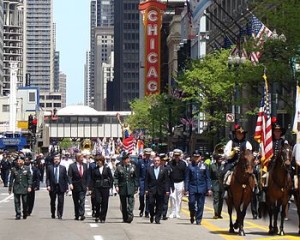 I learned a lot about Chicago politics from two people. The first was populist William “Bill” Singer whose surprise election as alderman upset the “Daley Machine” in 1969. Bill Singer was speaking, doing the college circuit in 1971 protesting against the Vietnam War and Chicago Democratic Machine politics. I listened to Singer’s talk, and his argument that Chicago politics needed “reform.” Singer ran for mayor in 1975, right when I was honorably discharged from the U.S. Military after serving two years active duty during the Vietnam War.
I learned a lot about Chicago politics from two people. The first was populist William “Bill” Singer whose surprise election as alderman upset the “Daley Machine” in 1969. Bill Singer was speaking, doing the college circuit in 1971 protesting against the Vietnam War and Chicago Democratic Machine politics. I listened to Singer’s talk, and his argument that Chicago politics needed “reform.” Singer ran for mayor in 1975, right when I was honorably discharged from the U.S. Military after serving two years active duty during the Vietnam War.
The second was another brilliant professor of Political Science, Milton Rakove, who became a good friend and mentor during my junior and senior years at the UIC. I had been drawn into pro-Arab activism after my military discharge but Rakove convinced me to focus on politics, which I did under his mentorship. I learned how American Arabs were disengaged from the American political system and didn’t vote.
During my military service I had an epiphany, a brilliant discovery that communications was the key to humanity. If you could master your own communications, you could influence the public. I saw it in a debate between an Arab and Israeli over the 1973 Arab-Israeli War. The Israeli was so smooth. He looked and sounded like an American while the Arab spokesman sounded like a foreigner who hated Americans.
So I responded well to Rakove, who was Jewish, as he taught me the fundamentals of politics. I tried my best to help change that by publishing a newspaper in 1975 (through 1977) called The Middle Eastern Voice.
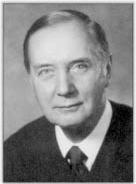
Michael Anthony Bilandic (Photo credit: Wikipedia)
That newspaper and my activism in American Arab politics prompted me to write letters to the editors of major publications including Time Magazine, Newsweek Magazine and the Chicago Tribune. When my letters were published, Arab activists turned to me and made me their spokesperson and I went so far to debate Israel’s Foreign Minister Abba Eban on a nationally televised debate over the Palestine-Israel conflict.
And, I’d write letters to the editor of my local community newspaper, applying what Rakove taught me that “all politics is local.” It was great to get Time and Newsweek to publish my views, but the real power was local. Each week, this crazy political gadfly named Alex Seth would write horrible columns attacking the Palestinians and lying about Israel. I started writing response columns, that the Southtown Economist published in its Wednesday or Sunday editions.
Finally, one day, the editor of the Southtown called me and offered me a job, which I took, dropping out of my senior year at the University. And it was great timing. Chicago’s longtime Mayor Richard J. Daley had just died, on Dec. 26, 1977. I had interviewed Daley a year earlier at his City Hall office for a photo story on Chicago accepting greetings from the Ambassador to Morocco. Morocco was the first nation to formally recognize the United States after the Revolutionary War.
His successor was Michael A. Bilandic, someone I had met while a student with Rakove. Rakove took our class to visit the offices of several aldermen including Edward M. Burke, and Vito Marzullo. Politics was about delivering services to your constituents. During the 1960s, a local Daley Machine precinct captain would visit our home and ask for our vote he gave us a new garbage can lid, which is something that was coveted back then.
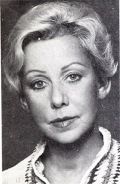
Jane Byrne
And in March 1978, months before Jane Byrne would announce her candidacy for mayor against Acting Mayor Bilandic, who succeeded Daley, the Chicago Daily News announced it was closing. The publisher of the Southtown, Bruce Sagan, announced that he was going to make his twice-a-week community newspaper into a daily newspaper. He asked if anyone wanted to go cover Chicago City Hall. No one wanted to go but I raised my hand up quickly. I had been there with Rakove and knew it would be great.
That summer Byrne announced and the Byrne-Bilandic clash was the biggest story in America, because Byrne threatened to become the first woman mayor of a major American city.
I remember election night on February 27, 1979. No one believed Byrne would beat Bilandic, although I and other journalists had watched Bilandic act strange as the pressures mounted. He made his famous Jesus Persecution speech at the Bismarck Hotel, which I covered. And his many futile attempts to look like a normal guy from the neighborhood, or explain why the snow removal had been so screwed up.
But Bilandic had the Machine and all Byrne had was the snow and former Daily News columnist now at the Chicago Sun-Times Mike Royko. And around 4:30 pm, the reporters at the City Hall press room, the Chicago Sun-Times’ Harry Golden Jr., WMAQ Radio’s Bill Cameron, The Chicago Tribune’s Bob Davis, WBBM Radio’s Bob Crawford and myself went to a Chinese Restaurant where we sat and enjoyed a traditional election night meal.

Ray Hanania and Harry Golden Jr., in the City Hall press room. Golden was Hanania’s journalism mentor and he helped get Hanania hired in 1985 at the Chicago Sun-Times.
At every major evening political event, like an election, the City Hall reporters who go out and have a good dinner someplace and then come back to cover the story. This was my first major election and the first time was I joined them. It was fun. No one suspected the Byrne victory. I ordered Hong Sue Shrimp and listened as Golden and Davis regaled over past elections and shared stories about Byrne and Bilandic. You had to have a great sense of humor to be a great journalist and these guys were the best. I was honored to be allowed into their circle.
When we returned to City Hall, there seemed to be a growing nervousness among several key aldermen. They had known for weeks what Chicago learned hours later, that Bilandic was going to lose the election. The Machine did everything they could to save Bilandic and preserve their clout. And when we went to the Democratic Headquarters at the Bismarck Hotel nearby, we surrounded Democratic Party Chairman George Dunne as he made his way through a crowded hallway lined with coat racks and tables to get his comments on what appeared to be Byrne’s victory.
Now, there was a crowd of some 40 reporters pushing against Dunne and everyone. TV crews consisted of three people, a reporter, a cameraman and a sound man holding a long boom microphone and recording box strapped on his shoulder. Literally a reporter fell down and everyone just walked over him as they peppered Dunne with questions. The herd steamrolled through the lobby knocking down a coat rack and pushing bystanders to the wayside in fear.
That’s what you saw on the faces of the Machine workers. Fear.
But the faces of the reporters, including mine, were on an intense adrenaline rush of excitement. Byrne’s victory was at the time the most significant story I was privileged to cover.
I learned several lessons that night. You can never really predict an election. The polls are not always right. The pundits make huge mistakes. And elections are always filled with surprises.
Things have changed a lot too. Politicians have become more honest while journalism has become more partisan and dishonest.

Blogger, Columnist at Illinois News Network Online
Ray Hanania is senior blogger for the Illinois News Network news site. He is an award winning former Chicago City Hall political reporter and columnist who covered the beat from 1976 through 1992 (From Mayor Daley to Mayor Daley). And, Hanania is a stubborn and loud critic of the biased mainstream American news media.
Hanania Chicago political beats and Chicago City Hall at the Daily Southtown Newspapers (1976-1985) and the Chicago Sun-Times (1985-1992). He published the The Villager Community Newspapers covering 12 Southwest suburban regions (1993-1997). Hanania also hosted live political news radio talkshows on WLS AM (1980 - 1991), and also on WBBM FM, WLUP FM, WSBC AM in Chicago, and WNZK AM in Detroit.
Hanania is the recipient of four (4) Chicago Headline Club “Peter Lisagor Awards” for Column writing. In November 2006, he was named “Best Ethnic American Columnist” by the New American Media;In 2009, he received the prestigious Sigma Delta Chi Award for Writing from the Society of Professional Journalists. Hanania has also received two (2) Chicago Stick-o-Type awards from the Chicago Newspaper Guild, and in 1990 was nominated by the Chicago Sun-Times for a Pulitzer Prize for his four-part series on the Palestinian Intifada.
Hanania’s writings have been published in newspapers around the world. He currently is syndicated through Creators Syndicate. He has written for the Jerusalem Post, YNetNews.com, Newsday in New York, the Orlando Sentinel, the Houston Chronicle, The Daily Star of Lebanon, the News of the World in London, the Daily Yomimuri in Tokyo, Chicago Magazine, the Arlington Heights Daily Herald, The Saudi Gazette, the Arab News in Jeddah, and Aramco Magazine.
Hanania's Chicagoland columns are published in the Southwest News-Herald, the Des Plaines Valley News, the Regional News and the Palos Reporter newspapers.
He is President/CEO of Urban Strategies Group media and public affairs consulting which has clients in Illinois, Florida, Michigan and Washington D.C.
His personal website is www.TheMediaOasis.com. Email him at:
[email protected].
Latest posts by Ray Hanania (see all)
Related
 Blog Posts
Blog Posts

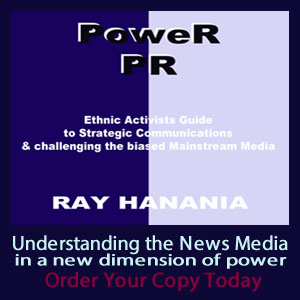




My first election in a long line of elections
I entered journalism during a turbulent time in American politics. But I learned several things from covering so many elections over the years, you can’t predict an election outcome, especially in Chicago.
By Ray Hanania
I was drawn to the election because of something Goldwater did. For many years during the 1950s and early 1960s, school children were taught to “duck and cover,” in response to what everyone believed would be a nuclear war with the Soviet Union. We hid under our desks.
Goldwater kept playing a commercial on TV that showed an atomic bomb exploding, only raising our fears of being incinerated by the explosion, or being eaten by giant Varanus komodoensis, or Komodo Dragons turned into even bigger monsters than they already were by the radiation. Those theories were fueling a hugely popular daytime science fiction genre of aliens and monsters created by nuclear weapons, like the giant ants in the scary movie, at the time, Them!
Senator Barry Goldwater (Photo credit: Wikipedia)
I think my dad supported Goldwater, who had a very cool campaign slogan. Au H2O, the periodic symbols for Gold and Water. But the nukes scared me and I rebelled against my Republican family and placed an “All the way with LBJ” poster on my bedroom window facing the front of the house.
LBJ had several advantages. He succeeded President John F. Kennedy who was murdered right before our eyes. The handsome president with the cute kids had died and the man who allegedly shot him was assassinated, right on live TV, too.
There were other reasons why Goldwater lost. JFK and LBJ had cool acronyms everyone knew well. Besides the Periodic Table element symbols, Goldwater only had BG which lacked the same powerful rhythm.
I actually cast my first unofficial vote a few years later in 8th Grade.
One of my teachers polled the classroom to see who we thought would win the U.S. Senate Race in 1966, Republican Charles Percy or Democrat U.S. Senator Paul Douglas.
Illinois Senator Charles H. Percy. (Photo credit: Wikipedia)
It wasn’t that I was interested in politics at all. I was interested in girls, and going to the JCC with my friends every Thursday for the sock hops. It was at the start of 8th Grade, and a tough year with an English teacher who was insufferable towards me. Being the only Arab in a largely Jewish school system, it only got worse in the coming year.
I didn’t know what a senator did. In fact, I really didn’t understand the concept of “politics” that wound up defining my life in journalism and writing. Politics seemed to involve violence.
I only became interested because one day in school, one of my teachers polled the classroom to see who we thought would win. The teacher showed portraits of Percy and Douglas and asked, “Who would you vote for?”
Douglas looked like a grumpy old man, like one of the neighbors who was always accusing the kids on the block of breaking into his strawberry patch and eating all his strawberries. Percy looked like a happy person. He was smiling and had a bright face, light brown hair, and kind of reminded everyone of Kennedy.
Percy won that classroom poll hands down. And he went on to win the election, and took the office in January 1967.
The ugly side of politics came out in a big way, too. Percy’s daughter, Valerie, had been murdered during the election campaign, so it built up a lot of sympathy for Percy, the father. That year, too, a drifter murdered eight student nurses a few blocks south of where we lived on Chicago’s Southeast Side. And the following year, Israel attacked the neighboring Arab countries after years of mounting tensions and occupied all of the remaining land that belonged to my family.
English: John F. Kennedy, photograph in the Oval Office. (Photo credit: Wikipedia)
And two years later, the neighborhood collapsed under the weight of racial tensions and White Flight. Our family moved west to the Bogan High school, where we attended for a few months before being expelled. I was the darkest kid in the school at the time when Bogan became the command center of anti-integration protests and rallies.
So, we entered nearby Little Flower Catholic High School, and then we moved again to Burbank where I attended Reavis High school.
I’m not really sure why, but at Reavis, my ethnicity was unusual but the tensions were not there like they were at Warren Elementary school or at Bowen High school. A neighbor came up to us when we moved into our home on west 84th Street in Burbank and yelled “Punjab” at myself and my mom. I didn’t know what “Punjab” meant.
So, I had a chance to do better in high school without the pressures of anti-Arab racism that permeated Warren Elementary school. Back in the 1970s, Christians were excited to learn that one of their neighbors came from Bethlehem and attended the Church of the Nativity where Jesus was born. Of course today, because of polarized politics, most American Christians have forgotten about Bethlehem and are redefining Jesus as a Navy Seal armed to the teeth with enough weapons to take out the entire Islamic religion. Well, at least that’s what it sounds like on FOX & Friends.
Still, I was flunking English composition. But a nice English teacher, Mrs. Harris, recognized I had a talent and convinced me to start writing a column about my favorite topic, rock and roll music, for the high school newspaper, The Blueprint. It helped. The next year, as a senior, I was named the newspaper’s editor.
Richard Milhous Nixon, 37th President of the United States (Photo credit: Wikipedia)
And that got me some cool assignments, including reviewing an interview one of my reporters did with Eugene McCarthy who was battling it out with Hubert H. Humphrey to get at President Richard M. Nixon. That election, and girl friends and a cool blown 409 engine Chevy SuperSport converted to a 327 engine opened the door to rock and roll music and the protests at the Democratic National Convention at downtown Chicago that summer. I was there when Chicago police attacked music goers at Grant Park while waiting for Sly and the Family Stone to land in their helicopter and perform.
When I went to college at Northern Illinois University in 1971, my conservative tendencies came out, though, back then I was both for and then against the Vietnam War. I had friends on both sides, some who served and some who dodged the draft. I studied under a brilliant political scientist, Professor Martin Diamond, who helped me understand the fundamentals of politics and Federalism. Although we had some great talks about the Middle East — me being Arab and him being Jewish — it never went anywhere for me, and I never thought of it as a career choice.
That influenced my very first ever real vote which was cast in November 1972 for Nixon, over Senator George McGovern. It was a year before my low draft number guaranteed that I’d be drafted into the war that Nixon promised to bring to an end.
The second was another brilliant professor of Political Science, Milton Rakove, who became a good friend and mentor during my junior and senior years at the UIC. I had been drawn into pro-Arab activism after my military discharge but Rakove convinced me to focus on politics, which I did under his mentorship. I learned how American Arabs were disengaged from the American political system and didn’t vote.
During my military service I had an epiphany, a brilliant discovery that communications was the key to humanity. If you could master your own communications, you could influence the public. I saw it in a debate between an Arab and Israeli over the 1973 Arab-Israeli War. The Israeli was so smooth. He looked and sounded like an American while the Arab spokesman sounded like a foreigner who hated Americans.
So I responded well to Rakove, who was Jewish, as he taught me the fundamentals of politics. I tried my best to help change that by publishing a newspaper in 1975 (through 1977) called The Middle Eastern Voice.
Michael Anthony Bilandic (Photo credit: Wikipedia)
That newspaper and my activism in American Arab politics prompted me to write letters to the editors of major publications including Time Magazine, Newsweek Magazine and the Chicago Tribune. When my letters were published, Arab activists turned to me and made me their spokesperson and I went so far to debate Israel’s Foreign Minister Abba Eban on a nationally televised debate over the Palestine-Israel conflict.
And, I’d write letters to the editor of my local community newspaper, applying what Rakove taught me that “all politics is local.” It was great to get Time and Newsweek to publish my views, but the real power was local. Each week, this crazy political gadfly named Alex Seth would write horrible columns attacking the Palestinians and lying about Israel. I started writing response columns, that the Southtown Economist published in its Wednesday or Sunday editions.
Finally, one day, the editor of the Southtown called me and offered me a job, which I took, dropping out of my senior year at the University. And it was great timing. Chicago’s longtime Mayor Richard J. Daley had just died, on Dec. 26, 1977. I had interviewed Daley a year earlier at his City Hall office for a photo story on Chicago accepting greetings from the Ambassador to Morocco. Morocco was the first nation to formally recognize the United States after the Revolutionary War.
His successor was Michael A. Bilandic, someone I had met while a student with Rakove. Rakove took our class to visit the offices of several aldermen including Edward M. Burke, and Vito Marzullo. Politics was about delivering services to your constituents. During the 1960s, a local Daley Machine precinct captain would visit our home and ask for our vote he gave us a new garbage can lid, which is something that was coveted back then.
Jane Byrne
And in March 1978, months before Jane Byrne would announce her candidacy for mayor against Acting Mayor Bilandic, who succeeded Daley, the Chicago Daily News announced it was closing. The publisher of the Southtown, Bruce Sagan, announced that he was going to make his twice-a-week community newspaper into a daily newspaper. He asked if anyone wanted to go cover Chicago City Hall. No one wanted to go but I raised my hand up quickly. I had been there with Rakove and knew it would be great.
That summer Byrne announced and the Byrne-Bilandic clash was the biggest story in America, because Byrne threatened to become the first woman mayor of a major American city.
I remember election night on February 27, 1979. No one believed Byrne would beat Bilandic, although I and other journalists had watched Bilandic act strange as the pressures mounted. He made his famous Jesus Persecution speech at the Bismarck Hotel, which I covered. And his many futile attempts to look like a normal guy from the neighborhood, or explain why the snow removal had been so screwed up.
But Bilandic had the Machine and all Byrne had was the snow and former Daily News columnist now at the Chicago Sun-Times Mike Royko. And around 4:30 pm, the reporters at the City Hall press room, the Chicago Sun-Times’ Harry Golden Jr., WMAQ Radio’s Bill Cameron, The Chicago Tribune’s Bob Davis, WBBM Radio’s Bob Crawford and myself went to a Chinese Restaurant where we sat and enjoyed a traditional election night meal.
Ray Hanania and Harry Golden Jr., in the City Hall press room. Golden was Hanania’s journalism mentor and he helped get Hanania hired in 1985 at the Chicago Sun-Times.
At every major evening political event, like an election, the City Hall reporters who go out and have a good dinner someplace and then come back to cover the story. This was my first major election and the first time was I joined them. It was fun. No one suspected the Byrne victory. I ordered Hong Sue Shrimp and listened as Golden and Davis regaled over past elections and shared stories about Byrne and Bilandic. You had to have a great sense of humor to be a great journalist and these guys were the best. I was honored to be allowed into their circle.
When we returned to City Hall, there seemed to be a growing nervousness among several key aldermen. They had known for weeks what Chicago learned hours later, that Bilandic was going to lose the election. The Machine did everything they could to save Bilandic and preserve their clout. And when we went to the Democratic Headquarters at the Bismarck Hotel nearby, we surrounded Democratic Party Chairman George Dunne as he made his way through a crowded hallway lined with coat racks and tables to get his comments on what appeared to be Byrne’s victory.
Now, there was a crowd of some 40 reporters pushing against Dunne and everyone. TV crews consisted of three people, a reporter, a cameraman and a sound man holding a long boom microphone and recording box strapped on his shoulder. Literally a reporter fell down and everyone just walked over him as they peppered Dunne with questions. The herd steamrolled through the lobby knocking down a coat rack and pushing bystanders to the wayside in fear.
That’s what you saw on the faces of the Machine workers. Fear.
But the faces of the reporters, including mine, were on an intense adrenaline rush of excitement. Byrne’s victory was at the time the most significant story I was privileged to cover.
I learned several lessons that night. You can never really predict an election. The polls are not always right. The pundits make huge mistakes. And elections are always filled with surprises.
Things have changed a lot too. Politicians have become more honest while journalism has become more partisan and dishonest.
Ray Hanania
Hanania Chicago political beats and Chicago City Hall at the Daily Southtown Newspapers (1976-1985) and the Chicago Sun-Times (1985-1992). He published the The Villager Community Newspapers covering 12 Southwest suburban regions (1993-1997). Hanania also hosted live political news radio talkshows on WLS AM (1980 - 1991), and also on WBBM FM, WLUP FM, WSBC AM in Chicago, and WNZK AM in Detroit.
Hanania is the recipient of four (4) Chicago Headline Club “Peter Lisagor Awards” for Column writing. In November 2006, he was named “Best Ethnic American Columnist” by the New American Media;In 2009, he received the prestigious Sigma Delta Chi Award for Writing from the Society of Professional Journalists. Hanania has also received two (2) Chicago Stick-o-Type awards from the Chicago Newspaper Guild, and in 1990 was nominated by the Chicago Sun-Times for a Pulitzer Prize for his four-part series on the Palestinian Intifada.
Hanania’s writings have been published in newspapers around the world. He currently is syndicated through Creators Syndicate. He has written for the Jerusalem Post, YNetNews.com, Newsday in New York, the Orlando Sentinel, the Houston Chronicle, The Daily Star of Lebanon, the News of the World in London, the Daily Yomimuri in Tokyo, Chicago Magazine, the Arlington Heights Daily Herald, The Saudi Gazette, the Arab News in Jeddah, and Aramco Magazine.
Hanania's Chicagoland columns are published in the Southwest News-Herald, the Des Plaines Valley News, the Regional News and the Palos Reporter newspapers.
He is President/CEO of Urban Strategies Group media and public affairs consulting which has clients in Illinois, Florida, Michigan and Washington D.C.
His personal website is www.TheMediaOasis.com. Email him at: [email protected].
Latest posts by Ray Hanania (see all)
Share this:
Related